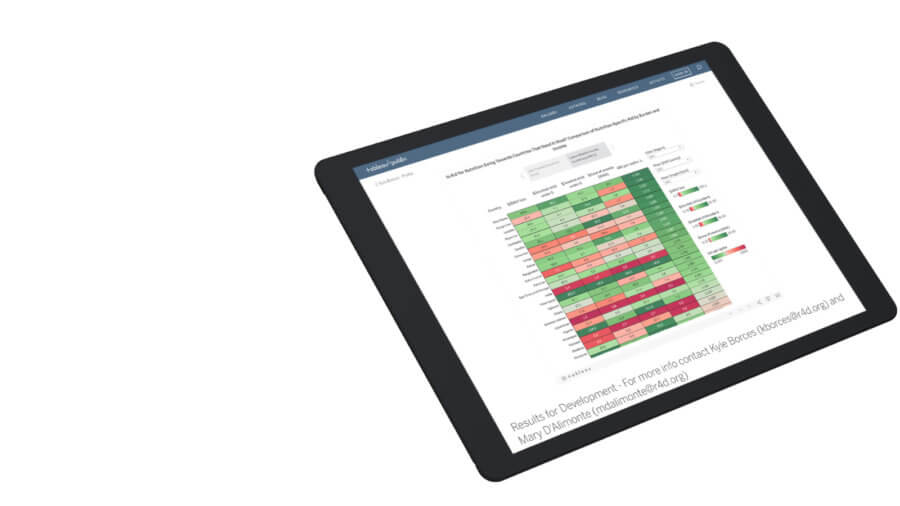Nutrition funding is falling short of what is needed to meet escalating needs. Results for Development is working at the global and country level to mobilize more strategic and sustainable financing for nutrition and to maximize the impact of those investments.
Sustainable Nutrition Financing
The Challenge
Malnutrition is a pervasive problem around the world that continues to take lives and prevent people from reaching their full potential. Due to conflict, climate change and the lasting impacts of the COVID-19 pandemic, malnutrition is on the rise. Despite the urgent need to invest in nutrition, current financing levels are drastically insufficient. Change agents at national and sub-national levels are requesting help answering critical questions, including:
- How much will it cost to scale up effective nutrition interventions across sectors?
- How much is already being spent on specific nutrition interventions and how much more is needed?
- How much can different actors (country governments, donors, the private sector) contribute to achieve the global nutrition goals?
- How can innovative sources of funding be leveraged for nutrition?
- How can progress be measured and different parties held accountable for their commitments at the global, national or sub-national level?
- How can resources from diverse sources be coordinated and allocated efficiently and equitably?
Our Approach
Results for Development works with stakeholders at global, regional, national and sub-national levels to increase funding to end malnutrition. We support change agents with cutting edge tools, training, technical support and evidence to advocate for more domestic and donor funding for nutrition and to optimize those investments.
Our expertise in sustainable financing for nutrition combines strong budget and financial analytics, deep knowledge of government policy and budgeting processes, and nutrition sector expertise. We also have experience in supporting policymakers to enact large-scale change. We work in close consultation with government officials, donors and civil society to understand what data they need to increase funding for nutrition and allocate funding most effectively. Our work includes:
- Supporting change agents to finance and meet ambitious nutrition targets
- Supporting the development of sustainable financing frameworks for nutrition in country and action plans
- Tracking donor funding for nutrition and monitoring annually
- Supporting strategic purchasing for nutrition within primary health care
- Developing options to maximize the nutrition impact of investments in agrifood systems and across sector
Examples of our Work
- Facilitating a global network of countries and nutrition experts: R4D hosts the new Finance Capacity Development Platform (FCDP) for SUN countries with partners Spark Health Africa and Health Strategy and Delivery Foundation (HSDF). FCDP is a country-led platform that provides tailored support, demand-driven tools and resources and opportunities for peer-to-peer exchange with the goals of increasing funding for nutrition and ensuring more strategic use of funding to accelerate impact on nutrition outcomes.
- Supporting countries to develop sustainable financing strategies: Through the Sustainable Financing for Nutrition (SUSTAIN) project, R4D supports the governments of Nigeria, Ethiopia, Ghana and Malawi in their efforts to increase country-level financing for nutrition. We do this by strengthening the capacity of government and local partners to develop evidence-based sustainable financing strategies across sectors. In Nigeria, 17 states developed sustainable financing frameworks for nutrition. In Ethiopia, R4D supported the Ministry of Health to develop a Resource Mobilization Plan for the Seqota Declaration Scale Up and Expansion Phases, which the government used to mobilize domestic resources. In Ghana and Malawi, R4D supported the development of frameworks to guide sustainable financing for nutrition at the national level for both countries, and at the sub-national level for 17 districts in Northern Ghana and four districts in Malawi.
- Tracking donor investments to drive more and better financing for nutrition: In 2017, the World Bank, R4D and 1000 Days created the Investment Framework for Nutrition as a roadmap to achieve the WHA nutrition targets by 2025. Since then, R4D has tracked donor disbursements to priority interventions to monitor progress toward the financial benchmarks laid out in the Investment Framework. This annual analysis provides valuable insight on donor spending for wasting, stunting, anemia, exclusive breastfeeding, and enabling environment interventions, informing advocacy efforts to drive more and better financing for nutrition in the future.
- Optimizing donor resource tracking for nutrition: In 2018, the Organization for Economic Co-operation and Development (OECD) introduced the nutrition policy marker (NPM) to better identify, report and monitor multi-sectoral nutrition activities. The NPM presents an opportunity to ensure accurate, transparent reporting against new financial commitments, but introducing a new policy marker into financial tracking and reporting systems is complex. Through USAID Advancing Nutrition, R4D supported the SUN Donor Network to strengthen donor resource tracking for nutrition by making recommendations on applying and interpreting the NPM. R4D provided tailored technical assistance, conducted annual analysis of NPM data, and created three advocacy resources to help NPM users effectively communicate about the marker and attract new users.
- Providing evidence on the costs and benefits of investing in agrifood systems: R4D partnered with the Food and Agriculture Organization of the United Nations (FAO) to support countries in their efforts to strengthen agrifood systems for greater nutrition impact. This work explores evidence on what works to achieve a healthy diet and improve dietary diversity within agrifood systems, as well as the associated costs and benefits. It also provides practical evidence-based recommendations on how to optimize agrifood system investments for maximum nutrition impact. R4D highlighted investment experiences in India, Bangladesh, Palestine and Ethiopia to better understand how agrifood system investments can promote healthy diets.
Tracking Aid for The WHA Nutrition Targets: Targeting Countries Most In Need
With a growing body of data on donor aid for nutrition, a key question arises: Is aid for nutrition targeted to countries most in need?
















